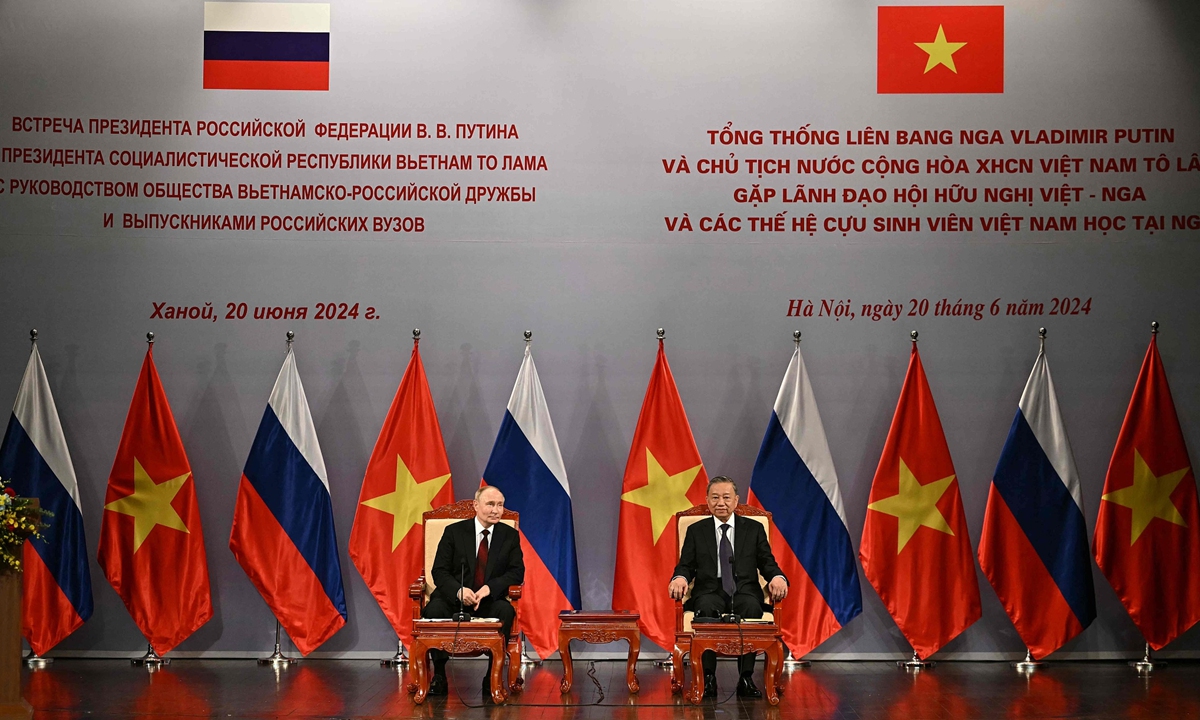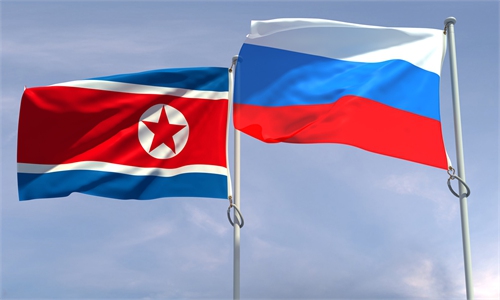Moscow, Hanoi deepen ties to 'Washington’s annoyance'
US' hegemony-centered world order is disintegrating: analyst

Russia's President Vladimir Putin (L) and Vietnam's President To Lam (R) take part in an event attended by the Vietnam Friendship Association and generations of Vietnamese alumni that studied in Russia at the Hanoi Opera House in Hanoi on June 20, 2024. Photo: VCG
Russian President Vladimir Putin has arrived in Vietnamese capital Hanoi after a state visit to Pyongyang, starting his first visit to the country since 2017, drawing an anxious tone of criticism from the US.
Large crowds of residents waved the two countries' flags and a 21-gun salute was held to welcome the Russian leader, according to Vietnam News.
The two sides discussed collaboration in "trade and economic, scientific, technological and humanitarian areas" and also exchanged views on key issues on the international and regional agenda, according to media reports.
Putin called Vietnam one of Russia's most reliable partners, and said relations had come a long way and withstood many tests with honor, TASS reported. The two countries also agreed that the Asia-Pacific region needs a reliable security architecture without military blocs.
This visit is of great significance, further deepening the Vietnam-Russia comprehensive strategic partnership in all fields, especially in the context of the two countries striving to realize the joint statement on the comprehensive strategic partnership vision to 2030, Vietnam News Agency (VNA) reported Thursday.
There is ample room to promote trade between Vietnam and Russia's Far East, head of the Vietnam Trade Office Branch in the Far East region Nguyen Hong Thanh told VNA, expressing the hope of opening connection channels between enterprises and tourists, new air routes and removing payment barriers.
President Putin's visit takes place in the context of the rapidly developing, comprehensive, and amicable Vietnam-Russia relationship. It serves as a model of mutually beneficial and equal cooperation, for the sake of peace, cooperation, and development in the region and worldwide, Vietnam News reported.
For Russia, its diplomacy is "turning east and moving south," in order to have practical cooperation with "the majority of the world" in energy, food, technology and other fields, seek support from the "middle land" in major power competition, and tackle Western containment and diplomatic isolation, Zhao Long, deputy director of the Institute of Global Governance at the Shanghai Institute for International Studies, wrote in an opinion piece for the Global Times.
The development of Russia-Vietnam relations is based on the two sovereign countries' interests and is conducive to strategic stability and balance in the region, Li Haidong, a professor at the China Foreign Affairs University, told the Global Times on Thursday.
However, the US is unhappy with their relationship. Voice of America claimed the visit will put Vietnam in a difficult position and could even be seen as risky for Hanoi, expecting no breakthrough from the visit.
"No country should give Putin a platform to promote his war of aggression," a US embassy spokesperson in Hanoi told media.
Li said the US has to accept the reality that its attempt to isolate Russia by forcing other countries to take sides is futile. There are many countries that do not want to be US puppets, and Washington, despite being unhappy with that, has to adapt to it, Li noted.
Vietnam, which officially pursues a neutral foreign policy that it calls "bamboo diplomacy" in its relations with world powers, did not join the Western condemnation of Russia over its military operation in Ukraine, media reported.
By pointing fingers at Russia-Vietnam relations, the US only exposes its "sense of privilege" in strength, ideology and system when handling foreign affairs, Li said.
US President Joe Biden visited Vietnam in September 2023, during which the two countries upgraded their relationship to a comprehensive strategic partnership.
But the US should stop dreaming of pushing Vietnam around with this relationship, as the US hegemony-centered world order is disintegrating and Washington should learn to deal with other sovereign countries on an equal footing, analysts said.



